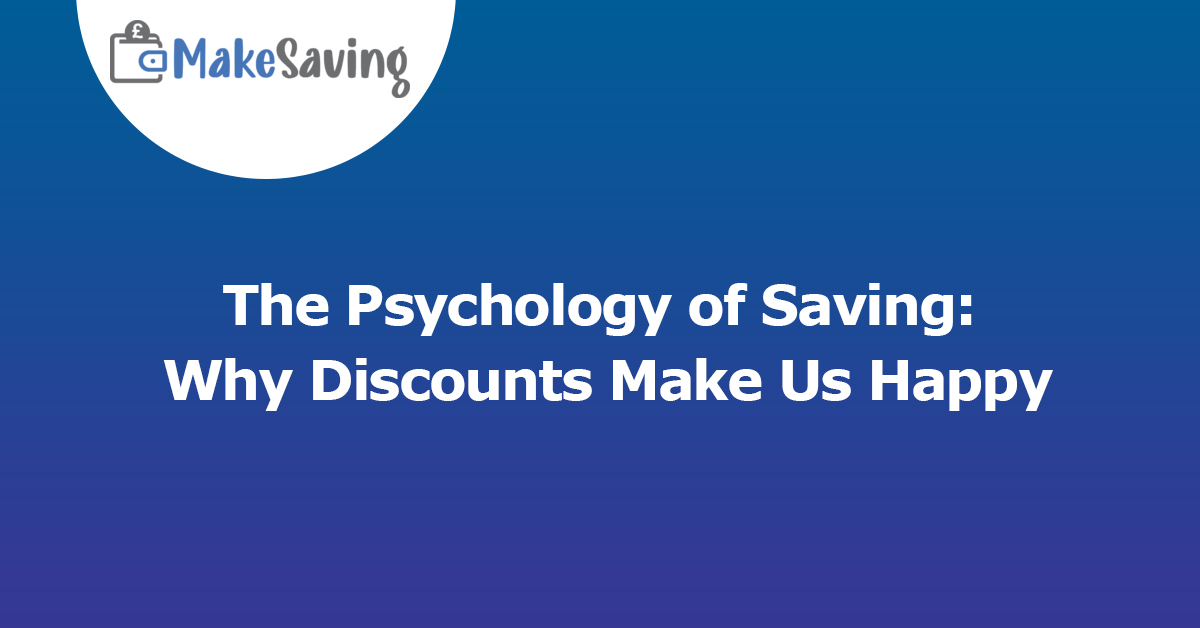
The Psychology of Saving: Why Discounts Make Us Happy
Let’s be honest — we’ve all felt that little buzz of joy after scoring a great deal online. Whether it’s a 20% off promo code, a half-price clearance item, or an unexpected free shipping offer, there’s something about saving money that just feels good.
But why is that?
In this blog, we’re diving deep into the psychology of saving, exploring what actually happens in your brain when you find a discount, why humans are wired to love deals, and how you can use this knowledge to shop smarter (and happier!).
🧬 1. Your Brain on Discounts: The Science Behind the Smile
When you discover a great deal, your brain releases dopamine, the “feel-good” chemical. It’s the same chemical released when you eat chocolate, hear your favourite song, or receive a compliment.
Here’s what happens:
- You see a deal — say 40% off a new jacket.
- Your brain registers this as a reward.
- Dopamine is released.
- You feel a rush of pleasure and satisfaction.
This reaction is actually tied to survival instincts. Thousands of years ago, humans had to seek out scarce resources. Finding a “bargain” (like food or shelter) meant survival. Today, our brains react the same way to digital coupons and flash sales.
🎉 2. The Thrill of the Hunt
There’s something satisfying about searching for the best deal — and actually finding it. It creates a sense of achievement.
- When you compare prices, hunt down voucher codes, and apply the perfect discount at checkout, your brain processes it as a win.
- This triggers positive reinforcement, which makes you want to repeat the behaviour again.
That’s why websites like MakeSaving.co.uk are so addictive — they’re essentially a digital treasure hunt where everyone wins.
💡 3. Anchoring Effect: Why Discounts Feel Bigger Than They Are
Ever seen something marked “WAS £100, NOW £50” and felt an overwhelming urge to buy it?
That’s the anchoring effect in action — a cognitive bias where we rely too heavily on the first piece of information (the anchor) we see.
Example:
If the original price is £100, and you see it for £50, your brain thinks:
“Wow! I’m saving £50! What a deal!”
Even if the item isn’t worth £100 to begin with, your brain processes the perceived savings as real value. Retailers know this — and use it to full effect.
🛒 4. Fear of Missing Out (FOMO) and Flash Sales
Limited-time offers, countdown timers, and “only 3 left in stock!” messages play on your FOMO (Fear of Missing Out).
Why it works:
Humans are loss-averse — we feel the pain of losing out more than the joy of gaining. So when we see a deal might disappear soon, we’re more likely to act fast.
Even seeing a voucher code with an expiry taps into this psychological trigger. That’s why flash sales are so effective (and exciting!).
🤝 5. Social Validation: Sharing Deals Feels Good
Ever shared a great discount with a friend or family member?
That’s because scoring a deal doesn’t just feel good — sharing that win makes us feel even better. It strengthens our social bonds and gives us a boost of validation when others say, “Nice find!”
Websites like MakeSaving.co.uk often include share buttons for this very reason. People love to pass on savings — it’s a form of modern generosity.
🧠 6. Buyer’s Guilt vs. Buyer’s High
Usually, spending money can trigger buyer’s remorse — that nagging feeling that you spent too much or shouldn’t have bought something at all.
But with discounts?
That guilt is reduced or even eliminated because:
- You feel you got “value for money”
- You tell yourself you were smart to wait for the deal
- The discount acts as justification for the purchase
This creates a “buyer’s high” — the feel-good version of shopping that leaves no regret behind.
💸 7. Loyalty and the ‘Just One More Deal’ Effect
Finding one great deal often encourages people to keep shopping in hopes of finding more.
This is known as the reward loop — when your brain is rewarded once, it seeks more of the same.
It’s why people love using voucher code websites regularly. Saving becomes part of the routine. It’s not just about spending less — it’s about feeling like a smart shopper.
🧠 Practical Psychology: How to Use This Knowledge to Save Smarter
Understanding your shopping psychology can actually help you save more and avoid traps.
Here are some smart tips:
- Make a list first: Know what you actually need before hunting for deals.
- Set a budget: Don’t let the dopamine rush override your financial goals.
- Use trusted voucher platforms: Stick to verified deal sites like MakeSaving.co.uk to avoid fake codes.
- Wait for seasonal sales: Use your psychological desire to save wisely — plan your buys around Black Friday, Boxing Day, and more.
- Pause before buying: If you’re feeling overly excited, wait 24 hours — you might realise you don’t need the item after all.
🔄 The Feel-Good Feedback Loop
Here’s how it works:
- You find a deal
- You save money
- You feel good
- You want to save again
That’s the power of deal psychology — it turns shopping into a positive, empowering experience.
🎯 Final Thoughts: Smart Saving = Happy Shopping
The psychology of saving isn’t just about money — it’s about control, satisfaction, and joy.
When you save, you feel like you’ve outsmarted the system. You’re not just buying a product — you’re winning a little game. And the best part? Sites like MakeSaving.co.uk make sure you always have the best tools, codes, and tips to keep winning.
So next time you score that discount, embrace the happiness. You earned it.

